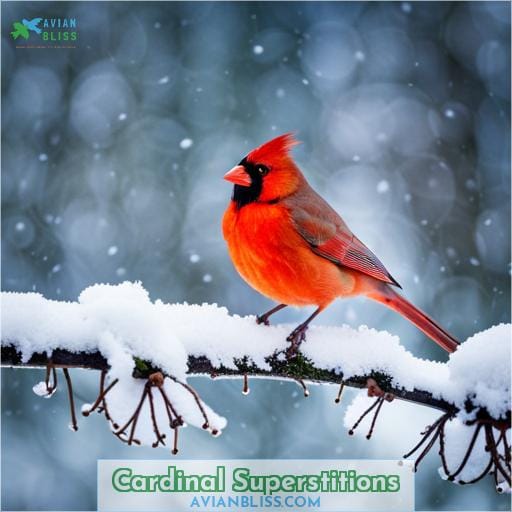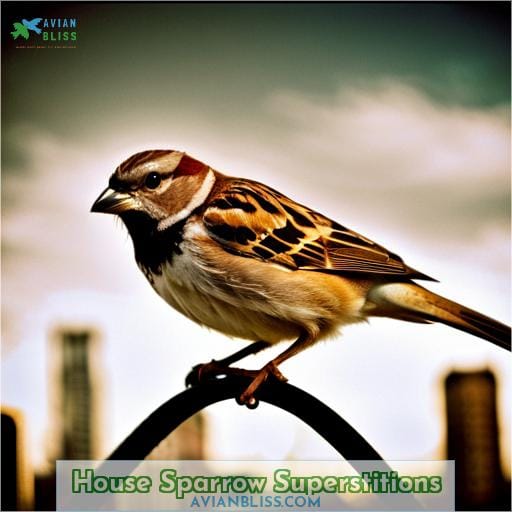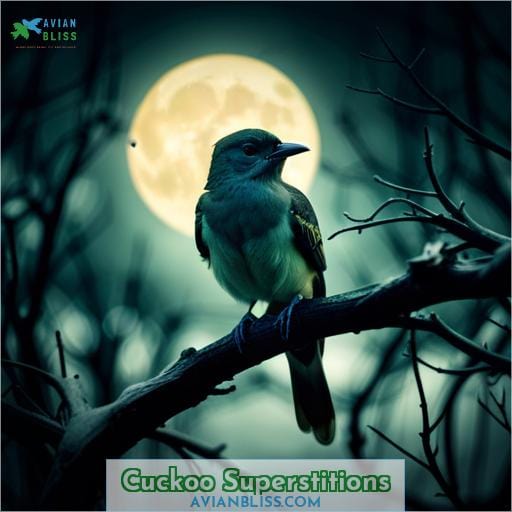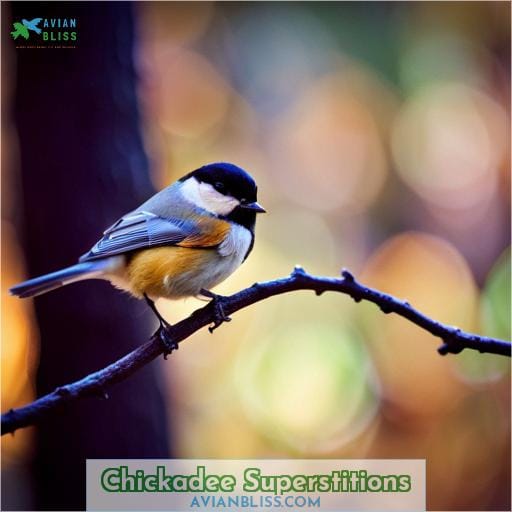This site is supported by our readers. We may earn a commission, at no cost to you, if you purchase through links.
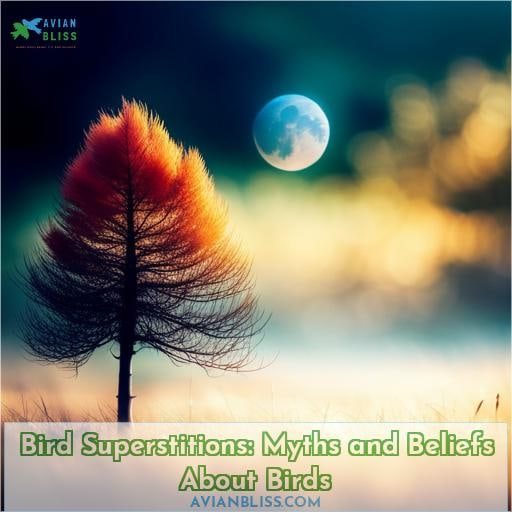
They’ve seeded myths, portents, and beliefs as diverse as the lands they traverse.
From the distant echoes of sailors’ warnings, to the poignant whispers of cherished memories, bird superstitions become a fascinating embodiment of our innate desire to decode the world’s mysteries.
In this intricate dance of beliefs, the albatross emerges as both harbinger of doom and beacon of fortune. The flutter of its wings stirs ominous shadows, for it’s said that taking the life of this majestic wanderer invites calamity.
However, a chance sighting while at sea paints a different tale—a tale of safe passage and promising shores.
From the cardinal’s scarlet robes to the owl’s silent wisdom, each feathered entity weaves its own story. Whether as emissary from beyond or token of luck, the alchemy of myth and reality continues to flourish.
It offers us a glimpse into the intricate relationship between the natural world and our unquenchable thirst for understanding.
Table Of Contents
Key Takeaways
- Birds have deep-rooted roles in cultural beliefs and superstitions, acting as messengers between the human and spiritual realms.
- Different bird species carry diverse symbolism, ranging from messengers of fate like the albatross to spiritual connectors like the cardinal.
- Birds’ symbolism often revolves around themes of mortality, transition, luck, and communication with unseen forces.
- Bird behaviors, whether in nature or dreams, are interpreted as significant omens or messages, reflecting a connection between human experiences and the natural world.
Albatross Superstitions
Amid the array of bird superstitions, the albatross emerges as both a harbinger of doom and fortune. Taking the life of this magnificent seabird is to court misfortune, while sighting it in the expanse of the open sea is hailed as a promising omen.
It’s Bad Luck to Kill an Albatross
Hovering over sailors’ fates like a shadow in flight, taking the life of an albatross is like beckoning the tempest’s wrath — a dire omen in maritime lore.
This nautical superstition is deeply rooted in seafaring cultures. It weaves the albatross into a tapestry of symbolism and taboo. Its image resonates in literature, especially in Coleridge’s The Rime of the Ancient Mariner.
Yet, this act goes beyond mere superstition. It’s a cultural phenomenon that illustrates the delicate balance between human actions and the unforgiving sea.
Today, the conservation of this majestic bird echoes the age-old message: respect nature’s signs.
Seeing an Albatross at Sea is a Good Omen
Catching sight of an albatross gliding gracefully above the open sea, you can’t help but feel a sense of reassurance and positivity wash over you—a silent connection to ancient beliefs intertwined with the boundless expanse of the ocean around you.
The maritime world has long held albatrosses as bearers of good fortune, their presence a beacon of hope to sailors. Birdwatching beliefs and nautical superstitions converge here, as these majestic birds symbolize safe passage and favorable winds.
The following table delves into the significance of this awe-inspiring creature in various cultures:
| Culture | Belief | Interpretation |
|---|---|---|
| Ancient Mariner Tale | Killing albatross brings curse | Ship’s misfortune |
| Polynesian | Albatross as reincarnated souls | Protection, guidance |
| Christian | Albatross as Christ-like | Redemption, salvation |
| Naval Traditions | Albatross sighting before a voyage | Safe journey ahead |
Albatross omens hold sway over the seas, bridging human existence and the mysteries of the deep. It’s a reminder that in the vast expanse, ancient bird superstitions and the yearning for liberation meld—a testament to the enduring power of nature’s signs in shaping our perceptions.
Cardinal Superstitions
Immersed in cultural beliefs and treasured traditions, encountering a cardinal assumes a special significance. When a cardinal crosses one’s path, it is viewed as a potent omen — an unmistakable sign that a departed loved one has paid a visit from the realm beyond.
This vivid red messenger not just brings the solace of cherished memories but also carries with it the promise of good luck, weaving together the realms of the ethereal and the fortunate in a sole, fleeting moment.
If You See a Cardinal, a Loved One Who Has Passed Has Come to Visit
Spotting a vibrant flash of red among the trees feels like a dearly departed loved one has chosen this cardinal messenger to bridge the realms and grace you with their presence once more. The visiting cardinal carries a profound spiritual message, transcending its bird form.
Its scarlet hue ignites feelings of liberation and power, reminding you of life’s intimate connections. Apart from cardinal sightings, cultural interpretations link cardinals to souls of the deceased and omens of death at sea.
Embracing this belief, you welcome a sense of closeness, finding solace in the cardinal’s crimson embrace.
If You See a Cardinal, You Will Have Good Luck
Encountering a cardinal unexpectedly promises a touch of serendipity and a sprinkle of favorable fortune on your path. Cardinal symbolism goes beyond its vivid feathers; these red-winged messengers are woven into the fabric of bird superstitions, carrying whispers of good luck.
From folklore to dreams, the cardinal’s spiritual meaning holds power and profundity. It’s not merely a bird; it embodies a connection between realms, bridging the ordinary and the ethereal. The cardinal’s vibrant presence kindles hope and optimism, offering a quiet assurance that life’s complexities are harmoniously orchestrated.
So, as you catch a glimpse of this scarlet envoy, embrace the luck it brings, and let its silent message fill your journey with whispered blessings.
Owl Superstitions
Explore the intriguing realm of beliefs surrounding the owl, as glimpsing this majestic creature during daylight hours is thought to foretell an eerie and unsettling fate. In the tapestry of bird superstitions, owls hold a unique place. Renowned as creatures of the night, their unexpected appearance in daylight magnifies their mystique.
The owl’s nocturnal symbolism, representing wisdom and mystery, takes on an even more enigmatic aura when encountered in the light of day. Origins of owl folklore stretch across cultures, intertwined with notions of death and the afterlife.
In ancient cultures, the owl often symbolized the transition between life and the spirit world. Many viewed the owl as a spiritual messenger, bridging the gap between our reality and the ethereal realm.
Its haunting call carried both reverence and foreboding, serving as a potent reminder of mortality. In some societies, a daytime owl’s presence indicated impending death—a harbinger of doom that stirred primal fears.
Daytime owl omens stir the human psyche, triggering thoughts of mortality, liberation, and concealed truths.
The owl’s unconventional behavior acts as a mirror to our subconscious desire for power over the unknown, offering a glimpse into a world where the boundaries of life and death blur. Across various cultures and eras, the owl’s symbolism remains a captivating embodiment of humanity’s quest to understand the mysteries lying beyond.
Magpie Superstitions
In the realm of bird superstitions, magpies assume a dual role, embodying both omens of ill fortune and harbingers of good luck. The crossing of paths with a lone magpie is often associated with bad luck, while the sight of multiple magpies is believed to bring blessings and positivity in various cultures.
It is Bad Luck to See a Magpie
As your gaze locks onto the ebony-plumed messenger of misfortune, a chill courses down your spine. The shadowed omen of sorrow, the magpie, has cast its ominous presence upon your path.
Magpie symbolism has deep roots in folklore and cultural beliefs. It is often associated with bad luck and impending doom. Its distinct chattering call is thought to foretell ill tidings. Meanwhile, its presence near homes is regarded as a sign of impending misfortune.
The magpie’s spiritual significance is entwined with notions of darkness and negativity. This makes it a harbinger of unsettling times. Within bird superstitions, its reputation stands as a potent reminder of life’s enigmatic twists.
Magpies Bring Good Luck
Witness the magpie’s presence as a herald of fortune, its appearance intertwined with positive twists of fate and the promise of auspicious times.
In the realm of magpie folklore, these birds hold the key to a tapestry of cultural beliefs, where their black and white plumage weaves a tale of luck and prosperity.
As if guided by ancient bird myths, magpies soar through the landscapes of various cultures, delivering messages of good fortune. From the United Kingdom to China, these enchanting creatures have ingrained themselves in our collective consciousness as bearers of positive tidings.
Their four-fold role in this realm of magpie cultural beliefs encompasses:
Harbingers of Joy: In the tapestry of bird superstitions, spotting a magpie is akin to discovering a hidden treasure, foretelling joyful moments and serendipitous encounters.
Counting the Blessings: The rhythmic chant One for sorrow, two for joy captures the essence of magpie symbolism, encouraging us to embrace the optimism they bring with their presence.
Binding Wishes with Feathers: Many cultures view magpies as mystical messengers, capable of carrying our desires to the universe and returning with the blessings we seek.
Safeguarding Relationships: In the realm of bird folklore, magpies are often seen as guardians of relationships, their presence a reminder to nurture the bonds that bring us happiness.
These magpie folk wisdom traditions remind us that even in a world governed by uncertainty, the sight of a magpie can serve as a beacon of hope, offering a reminder that luck and positivity are never too far away.
European Robin Superstitions
Immersed in ancient beliefs, the folklore encircling the European Robin implies a fascinating interplay between actions and consequences. The superstition decrees that whatever destiny befalls the robin—be it harm or kindness—will inevitably discover its reflection in your own life.
Moreover, if this crimson-breasted harbinger finds its way into your abode, tradition spins a chilling narrative: its presence ominously predicts an impending demise within those very walls.
What You Do to a Robin, Will Happen to You
Imagine harming a robin and experiencing misfortune in the same manner – a cosmic equilibrium linking actions to destiny. This facet of bird superstitions is known as Robin’s Retribution. It weaves a web of symbolic karma, reflecting ancient beliefs about birds.
The intricate tapestry of karmic birdlore tells a tale of cyclic fate, where interactions with these creatures go beyond the mundane.
Just as bird-window collisions and bird droppings luck have their influence, the robin acts as a sentinel of justice – a reminder that actions can reverberate through existence. Threads of auspicy and bird flight further intertwine your choices with unseen forces, dictating life’s symphony’s rhythm.
A Robin in the House Signifies Death
With a European Robin unexpectedly fluttering through your home’s threshold, an unshakable sense of foreboding and an omen of imminent demise may take hold.
The deeply rooted bird superstitions come alive as this small yet symbolic creature crosses into your sanctuary. Its vibrant red breast, often associated with life and vitality, now takes on an eerie connotation.
As you observe its movements, you can’t help but recall the ancient tales and cultural beliefs that bind this bird to notions of death and transition. The folklore origins of this superstition intertwine with the idea that birds are spiritual messengers, bridging our world with realms beyond.
This Robin’s omen, carrying symbolic messages, becomes a vessel of supernatural influence, a reminder of how deeply ingrained superstitions can impact our perceptions.
Woodpecker Superstitions
Listen closely for the rhythmic tapping of a woodpecker on a tree in your neighborhood; it may herald an upcoming visitor. The woodpecker’s drumming carries more than just the sound of its beak against bark; it resonates with a tapestry of folklore connections across cultures.
In the realm of bird superstitions, woodpeckers hold their own unique place, entwined with cultural interpretations that span from omens to communication.
| Woodpecker Omens | Cultural Interpretations | Woodpecker Communication |
|---|---|---|
| A woodpecker’s drumming is often considered a message from the spirit world, signifying a change or announcement. | In various cultures, the woodpecker’s rhythmic pecking is interpreted as a form of communication between the physical and spiritual realms. | Woodpeckers are believed to use their drumming as a means of communication, both to attract mates and establish territories. Their distinct rhythms have led to cultural associations with patterns of communication and messages. |
This avian messenger’s significance stretches beyond mere superstition. In marriage folklore, hearing a woodpecker’s drumming signifies the arrival of a guest, reinforcing the connection between woodpeckers and auspicious occasions.
Just as peacock feather symbolism varies between cultures, so do woodpecker superstitions.
While sailors once viewed these birds as a sign of smooth seas, their drumming took on a more mystical tone, speaking of hidden messages and powerful insights.
The woodpecker’s rhythmic cadence resonates through cultural narratives, inviting us to decode its symbolic language and embrace the unseen forces it embodies.
House Sparrow Superstitions
Perched on the eaves of homes like fleeting promises, the house sparrow weaves threads of fortune through the tapestry of old beliefs, carrying tales of souls and destiny.
In the realm of bird superstitions, these unassuming creatures bear significant weight. Across cultures, sparrows have long been regarded as messengers from the gods. Their delicate presence holds the power to foretell omens and protect from danger.
Folklore connections link the house sparrow to luck implications. Some view their presence as a harbinger of good fortune, while others consider them a bad omen.
Cultural variations add depth to this avian mystique. In some societies, these sparrows are seen as protectors. Their flights are believed to offer symbolic messages about one’s path in life. Even in ancient times, they were observed predicting future events.
The house sparrow’s flight, a silent yet resonant communicator of change, can carry a whispered promise of forthcoming shifts or challenges.
In this world of bird superstitions, the house sparrow stands as a tiny embodiment of both hope and apprehension. A feathered enigma that bridges the gap between the human realm and the unknown.
Cuckoo Superstitions
As you absorb beliefs passed down through generations, consider how the resonating call of the cuckoo has woven its thread of potential fortune into the tapestry of cultural thought.
The enigmatic song of the cuckoo has stirred both fascination and superstition across various societies. In folklore, the first cuckoo’s call marks a momentous occasion, bringing luck and heralding the arrival of spring.
This elusive bird has found its place not only in nature but also in literature.
Cuckoo omens have stirred human imagination for centuries. The bird’s unique behavior of laying eggs in other birds’ nests has inspired notions of trickery and deceit. However, its mystique isn’t confined to negative interpretations. In some cultures, hearing the cuckoo’s call with money in your pocket is seen as an auspicious sign of prosperity.
It heralds good fortune to come. Furthermore, the cuckoo’s role as a harbinger of warmer seasons connects it to ideas of rejuvenation and growth.
The cuckoo’s presence has sparked bizarre superstitions. For instance, the belief that turning your money upon hearing its call ensures its multiplication. On the other hand, the sight of a white cuckoo is often considered an omen of impending misfortune.
This intriguing duality mirrors other bird-related beliefs. While peacock feathers indoors might spell bad luck in some cultures, they bring luck and protection in others.
Within its melodic notes are layers of symbolism speaking to the human desire for liberation, power, and intimacy. The cuckoo’s song resonates as a reminder of the ever-turning wheel of fortune. It’s a call to seize opportunities and a connection to the cycles of life.
So, as you ponder these cuckoo myths and mysteries, let the bird’s call serve as a gentle nudge.
Chickadee Superstitions
If a Chickadee is happily chirping, you’re in for a spell of good weather ahead. These small birds, with their distinctive black caps and cheerful melodies, have earned quite a reputation in bird superstitions.
Beyond their charming aesthetics, Chickadee calls are often believed to herald favorable weather conditions.
The origins of these beliefs are rooted in folklore, where the Chickadee’s song was seen as a sign of impending warmth and clear skies. Cultural interpretations of Chickadee calls vary, but one common thread is their association with seasonal predictions.
Different cultures have come to view the Chickadee’s song as a reassuring prediction of fair weather, offering a sense of liberation from rainy days.
This taps into the innate human desire for a connection to the natural world and the power of interpreting signs from it. In the tapestry of bird superstitions, the Chickadee’s role adds an intimate touch, its presence going beyond avian behavior.
Similar to how bird droppings are often linked to good luck, the Chickadee’s call weaves an intricate web of positivity and anticipation. So, the next time you hear a Chickadee’s cheerful song, take a moment to revel in the cultural tapestry that connects us to nature’s rhythms.
General Bird Superstitions
Imagine a world where every encounter with our feathered friends becomes a delicate dance with destiny—a world where the mere sight of certain winged creatures can send shivers down your spine or set your heart aflutter with hope. Birds, those ethereal beings gracing our skies, carry with them a tapestry of superstitions woven through cultures and generations. Their behaviors and presence have evolved into omens, messengers, and symbols of both good and bad fortune.
Nesting Insights:
Bird nesting rituals, observed for centuries, have been believed to foretell the future. A blackbird’s nest on your house becomes an omen of good luck, while destroying a stonechat’s nest is said to beckon misfortune.
Feathers of Fate:
Bird featherlore is rich with significance. The wren’s feather, for instance, is thought to prevent drowning, while peacock feathers hold divergent meanings—bad luck in some cultures, yet potent symbols of luck in others.
Cryptic Behaviors:
Bird behavior often signals important messages. Birds entering homes can usher bad luck or even foreshadow death. Meanwhile, their calls and flight patterns are scrutinized for insights into the unknown.
Dreamscape Connections:
In dreams, birds take on a spiritual role, linking our world to the ethereal. Their appearances in dreams are believed to carry messages from beyond, guiding us through the labyrinth of fate.
Sailors’ Superstitions:
At sea, birds play a vital role in superstitions. The albatross, a harbinger of luck, can bring misfortune if harmed. Crows seen in specific locations are believed to carry omens of doom.
In this world, birds are more than just creatures; their presence carries layers of meaning, offering a tantalizing connection to the mysteries of life and destiny.
Conclusion
As we delve into the intricate web of bird superstitions, it’s clear that these feathered creatures hold profound significance in our cultural beliefs.
From the maritime warnings carried by the albatross to the comforting presence often associated with cardinals, and from the enigmatic wisdom embodied by owls to the dual nature attributed to magpies, birds have seamlessly woven themselves into our myths and convictions.
The European robin, the woodpecker, the house sparrow, the cuckoo, and the chickadee each come with their own unique tales.
Within these avian encounters, it’s impossible to disregard the mystical allure that birds bring to our lives. They function as messengers bearing both favorable and ominous omens, bridging the gap between us and ancient traditions, as well as deep-seated beliefs.
Whether it’s the haunting caw of a crow or the delicate song of a blackbird, the realm of bird superstitions proves to be captivating—a place where myth and reality gracefully take flight side by side.
So, keep your eyes wide open, for in the world of superstitions, birds stand as a constant and fluttering presence.


